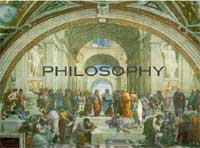Philosophy - PHILC14043
Stream Summary
Faculty: ARTSC - Faculty of Arts&Social Science
School: School of Humanities and Languages
Contact: hal@unsw.edu.au
Program: 4043 - Social Work (Honours) / Arts
Award(s):
Bachelor of Arts (Major)
View stream information for previous years
Stream Outline
Philosophy is different from other disciplines in that it raises questions about all aspects of human life and the world and investigates them systematically. The major stream in Philosophy focuses on interpretation of texts, balanced exposition and examination of issues, criticism of doctrines and beliefs commonly taken for granted, and construction and appraisal of arguments. The Philosophy curriculum seeks progressively to develop students’ skills in critical thinking and analysis, effective communication and persuasion in subject matter covered in the humanities and beyond. It also emphasises the intrinsic value of philosophy and philosophical thinking and analysis. The major stream provides courses and progression in three areas, or ‘streams’: ‘Epistemology and Metaphysics’, ‘Moral, Social, and Political Philosophy’, and ‘Philosophical Traditions’.
Aims of the Major Stream
The list of aims reflects the knowledge and understanding of philosophy and its various applications and methods, together with a profile of skills and capacities, which students should attain progressively through the period of their candidature.
Knowledge and Understanding
- knowledge of the theories and arguments of some of the major philosophers, encountered in their own writings;
- understanding of a number of major philosophical issues including arguments for or against proposed solutions;
- grasp of some central theories and arguments in the fields of epistemology and metaphysics, moral, social and political philosophy, and philosophical traditions, broadly understood;
- appreciation of the wide range of application of techniques of philosophical reasoning;
- appreciation of the place of philosophy, its ideas and techniques, in contemporary debates;
- appreciation of the importance of careful reading of texts and sensitivity to intellectual tradition;
- appreciation of the interpretative character of knowledge claims;
- appreciation of cogent arguments supported with reasons.
- ability to evaluate the success of standard arguments using a variety of techniques of formal and informal methods of reasoning as appropriate, together with an ability to recognise any relevant fallacies;
- ability to recognise the presuppositions and prejudices of knowledge claims;
- capacity to examine the authority of norms and values;
- ability to read and interpret texts drawn from a variety of ages and/or traditions with a sensitivity to context;
- ability to engage with relevant literature and independently to reflect on the quality of its arguments;
- ability to evaluate the relevance and quality of sources of information in relation to particular arguments;
- ability to formulate a coherent argument using a range of argumentative methods and reasoning strategies;
- capacity for a balanced and reasoned approach to contemporary issues and problems.
Stream Structure
- ARTS2301 Computers, Brains & Minds (6 UOC)
- ARTS2360 Truth and Belief (6 UOC)
- ARTS2361 Philosophy of Mind (6 UOC)
- ARTS2362 Freedom, Alienation, Modernity (6 UOC)
- ARTS2363 Chinese Philosophy (6 UOC)
- ARTS2367 Aesthetics (6 UOC)
- ARTS2372 Philosophy and Social Critique (6 UOC)
- ARTS2374 Ways of Reasoning (6 UOC)
- ARTS2384 Political Philosophy (6 UOC)
- ARTS2244 Rethinking Wildlife (6 UOC)
- ARTS2910 Philosophy and the Body (6 UOC)
- SAHT2641 Modern Aesthetics (6 UOC)
- ARTS3366 Advanced Moral Theory (6 UOC)
- ARTS3367 Race and Gender (6 UOC)
- ARTS3368 Social & Political Philosophy (6 UOC)
- ARTS3373 Contemporary Epistemology (6 UOC)
- ARTS3360 Philosophy Capstone (6 UOC)









